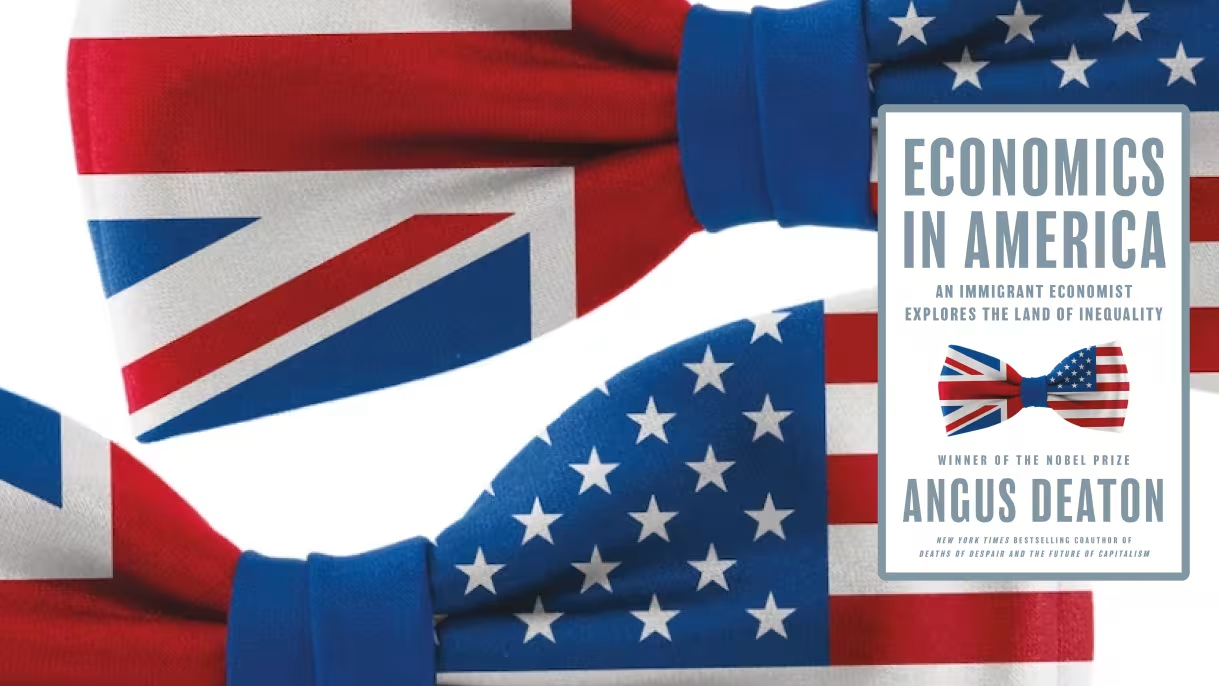

The Reviews Are In: Angus Deaton’s “Economics in America: An Immigrant Economist Explores the Land of Inequality”
Sir Angus Deaton isn’t afraid to call out the profession that made him who he is today. In “Economics in America: An Immigrant Economist Explores the Land of Inequality,” the Princeton emeritus scholar offers a refreshing take, critically examining the successes and failures tied to economic and political decisions in the United States.
The book explores all the topics you’d expect a Nobel Prize-winning economist to have an opinion on — from poverty, retirement, and the minimum wage to the trials and tribulations of being a British academic in America. As Deaton puts it, “These are all issues that I have been thinking and writing about for years. Now seemed like a good time to collect them together.”
Deaton’s words have elicited praise across the biblio-sphere, with reviews praising his wit and thorough knowledge of an economist’s world.
“For most of my working life, economics has been technical, largely concerned with the promotion of economic efficiency to the exclusion of other important social aims,” Deaton said. “This is in sharp contrast to the founders of the discipline, like Adam Smith, who was deeply concerned with social issues, ethics, and philosophy. Even as recently as 1926, John Maynard Keynes said that economics needed to reconcile three things — efficiency, social justice, and liberty. I believe that we have lost our concern with trying to balance these three things in policy, and that not doing so is at least in part responsible for the social and economic dysfunctions we see today.”
Read some of SPIA’s favorite reviews about Deaton’s “Economics in America: An Immigrant Economist Explores the Land of Inequality.”
“Deaton isn't necessarily the guy you'd expect to be such a prominent analyst of economic angst in America. Born in Scotland and educated at the University of Cambridge, he came to the United States in the early 1980s to teach at Princeton. In his new book, Economics in America: An Immigrant Economist Explores the Land of Inequality, Deaton recounts his journey to understanding the political and economic dysfunctions of his adopted home. It's sort of like Alexis De Tocqueville's classic Democracy in America, but with more numbers, more economics, and more vitriol.” — Greg Rosalsky, NPR
“Deaton’s reflections are not limited to commentary on past and present controversies about economics and economic policy. They also contain insights into topics ranging from the respective merits of teaching methods in American and European universities to the politics surrounding the Nobel Prize in Economics and how it affects, for good and ill, the lives and productivity of awardees.” — Samuel Gregg, Law & Liberty
“What Deaton provides is far more than a rehash of the tired debate on the trade-offs between equity and efficiency. Rather, he offers his own unique insider/outsider perspective on what we actually do as economists, why we are so often vilified for that work, and what we can do better to return our field to a place of genuine engagement with and influence upon the vital problems we face as members of the wider world.” — Joseph Ferrie, Journal of Economic Literature
“Above all, Deaton is critical of ‘economism,’ that is, of the naive belief that the world truly works as described in introductory economics textbooks. This assumption informs, or at least justifies, the presumption that individual choices are optimal, market outcomes are best, and government intervention only makes things worse — arguments that are widely invoked by the opponents of universal health insurance, legislated minimum wages, and antipoverty programs.” — Barry Eichengreen, Foreign Affairs
“A couple of sections look at the Nobel prizewinners that Deaton has known, and especially those that he respects. There was a part of me that enjoyed this, since I have met several, but a part that wondered whether this was something that the publisher felt would help sell the book. Having said that, a chapter on what economists actually do would potentially interest non-economists and I hope that they get that far. Perhaps I should have come first to this part of the review, since I think it is the most important. On the other hand, this section does not come first in the book and it is definitely in the conclusion. This is the analysis that the economy has been failing Americans without a four-year college degree for decades. The book is a great read, thoughtfully and well written. I see that it is available on Audible, read by the man himself. I think that would be a great place to start. The book with Anne Case – Deaths of Despair – is also there. I might get that next.” — Bridget Rosewell, The Society of Professional Economists

